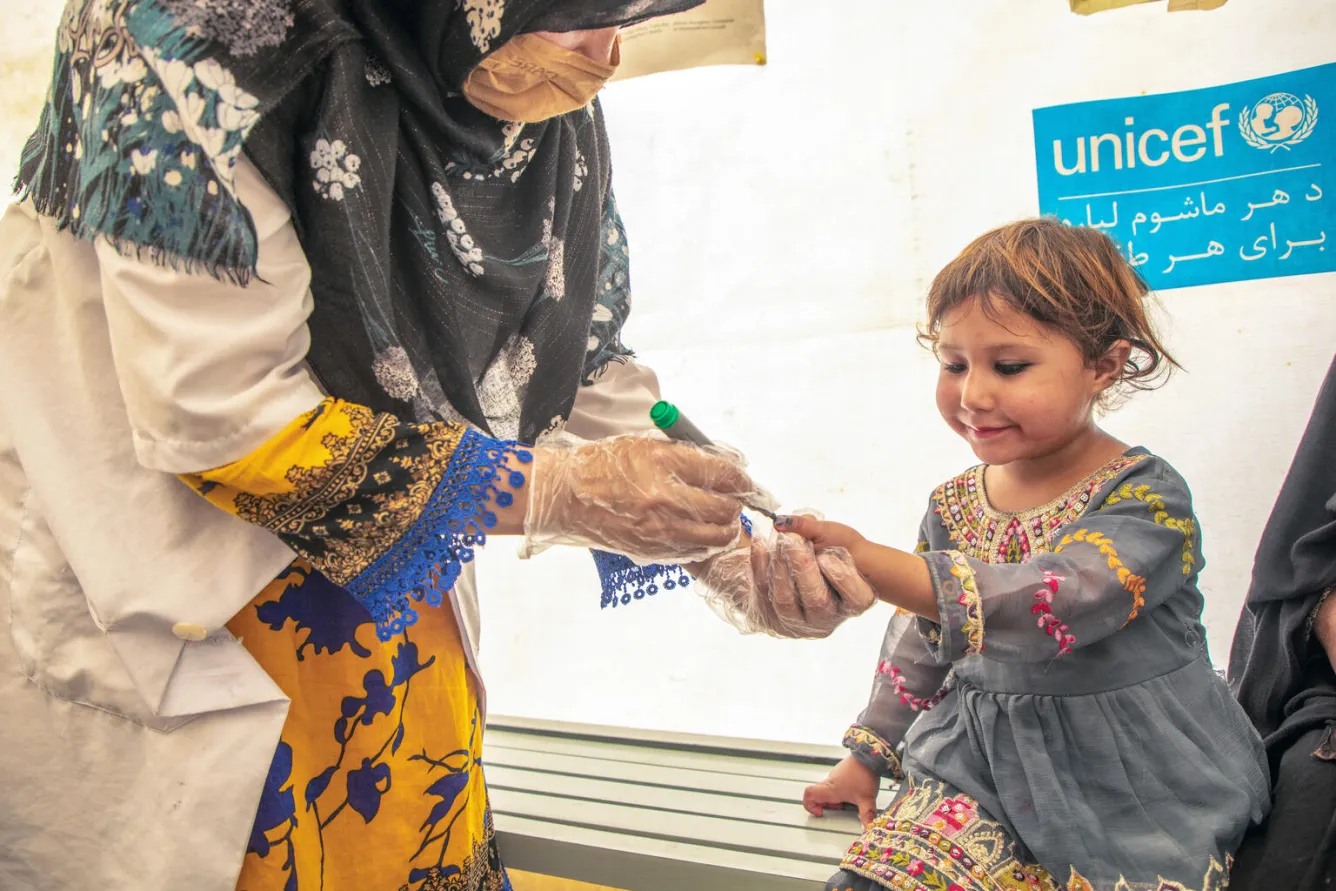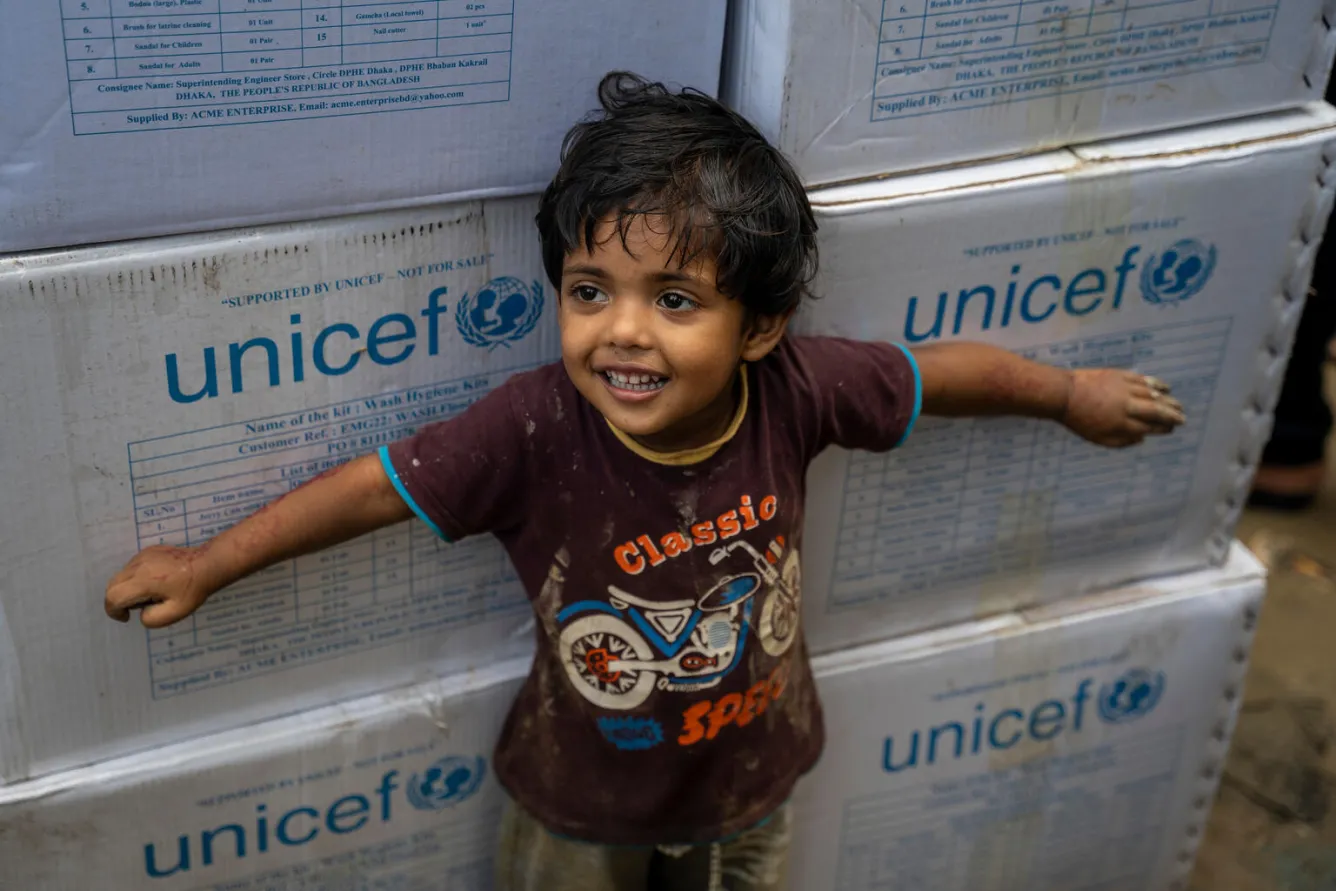2024 Global Results
It was a difficult time to be a child in 2024. With deepening conflict, climate shocks and poverty, children faced skyrocketing needs while the resources to respond continued to shrink.
But across more than 190 countries and territories, UNICEF was there, saving and uplifting the lives of millions of children – even in the hardest-to-reach places.
See how we are staying and delivering for children through some of our key global results for 2024.
Unrestricted Funding
UNICEF relies on voluntary contributions to uphold our mission of reaching every child.
Unrestricted funding – to be used flexibly for children wherever and whenever the need is greatest – played a critical role in helping UNICEF achieve results for every child in 2024.
When donors put their trust in UNICEF through unrestricted funding (also known as core resources or RR), they enable UNICEF to achieve the greatest impact for children by:
- Ensuring expert staff across all our program areas;
- Scaling up proven solutions and best practices for children globally;
- Leading and pioneering new ideas to respond effectively to complex children’s issues;
- Meeting children’s needs throughout childhood and adolescence;
- Being there before, during and after an emergency.
Thanks to the support of our donors and partners around the globe, the total amount of unrestricted income was US$1.584 billion in 2024, up from US$1.571 billion in 2023.
Unrestricted funds are spent on programs which affect all areas of children’s lives. Spending spans all five Goal Areas in UNICEF’s 2022–2025 Strategic Plan, covering children’s health, nutrition, education, protection, and water and sanitation needs, and all seven regions where UNICEF works.
In 2024, over two-thirds of unrestricted funds in regions were spent on development and less than a third on humanitarian programs. Most core resources were spent in sub-Saharan Africa, where children’s needs are the greatest.
International Programs
With the support of our donors and partners in Canada and around the world, UNICEF achieved the following results for each of our program pillars:
Health and Nutrition
- 35.6 million births in 89 countries were supported, benefiting 63.4 million children by managing neonatal and childhood illnesses, and training 1.2 million health workers.
- Adolescent health initiatives were expanded from 27 countries in 2021 to 44 in 2024, serving over 9.7 million adolescents.
- Mental health and psychosocial services were provided in 45 countries, through primary healthcare, schools and digital platforms, benefiting over 5.3 million children, adolescents and families.
- 441 million children under 5 benefited from programs to prevent stunting, wasting, micronutrient deficiencies and obesity; and 9.3 million children were treated for severe wasting and other forms of severe acute malnutrition.
- 2.8 billion vaccine doses were delivered to 99 countries and 110.4 million children immunized against measles, including 24.6 million in emergencies.
- Over 25 million adolescent girls received the HPV vaccine, and a new malaria vaccine was introduced in 17 countries.
Read UNICEF’s Global Thematic Funding Spotlight Report 2024 for health, nutrition and mental health.
Education
- 26 million out-of-school children, including 9 million in humanitarian settings and 3.7 million on the move, gained access to education. Learning materials reached 17.5 million children, 27 per cent in crisis- affected areas.
- The UPSHIFT skills development initiative was expanded to 56 countries, engaging 2.1 million young people, with 1.1 million completing the full learning journey and earning certification.
- More than 18 million children accessed education through digital platforms, including nearly 10 million through the Learning Passport.
- The Accessible Digital Textbooks initiative, developed with OpenAI, provided 2 million children in 11 countries with inclusive digital learning materials in 63 languages.
Read UNICEF’s Global Thematic Funding Spotlight Report 2024 for education.
CHILD PROTECTION
- 6.2 million children who experienced violence received health, social work, legal or law enforcement services across 110 countries, a 36 per cent increase from 2023.
- Nearly 759,000 girls and women across 19 countries received prevention and protection services against female genital mutilation (FGM).
- Nearly 10.7 million adolescent girls in 50 countries benefited from prevention and care interventions addressing child marriage.
- In 119 countries, UNICEF supported programs to improve legal and policy frameworks addressing child sexual abuse and exploitation, including online violence.
Read UNICEF’s Global Thematic Funding Spotlight Report 2024 for child protection.
Water, Sanitation and Hygiene
- Over 18 million people gained access to basic sanitation services, more than 33 million to safe water, and over 21 million to basic hygiene services.
- Water, sanitation and hygiene services in humanitarian emergencies were provided to 41 million people across more than 30 countries.
- Nearly 9,000 schools and almost 4,000 healthcare facilities were supported to achieve a basic level of water, sanitation and hygiene service provision, and UNICEF- supported programs addressed the menstrual health and hygiene needs of nearly 12 million women and adolescent girls.
- Renewable energy solutions were deployed in healthcare facilities across 66 countries to reshape energy access for children, while 6.7 million people used climate-resilient water systems and 3 million used climate-resilient sanitation facilities.
- Through the Green Rising initiative, 11 million young people in 30 countries planted 19 million trees, conserved 600 million liters of water, and recycled over 75,000 kilograms of waste.
Read UNICEF’s Global Thematic Funding Spotlight Report 2024 for water, sanitation and hygiene.
Learn more about UNICEF’s work in water, sanitation and hygiene.
Social Protection
- Over 102 million households across both development and humanitarian contexts were reached with UNICEF- supported cash transfers.
- UNICEF supported 91 countries to strengthen social sector budgets for greater and better investments in children, up from 84 in 2023 and exceeding the target of 69.
- Measurement, analysis or policy advice contributed to the development of policies and programs to reduce child poverty in 43 countries, up from 32 in 2021.
- UNICEF supported 77 countries to implement disability-inclusive social protection, up from 67 in 2023.
- UNICEF enhanced urban policies and planning standards for children in 18 countries (up from 15 in 2023) to address structural barriers to child well-being in urban settings and informal settlements.
Read UNICEF’s Global Thematic Funding Spotlight Report 2024 for social policy and social protection.

Humanitarian Response
In conflict and disaster, children suffer first and suffer most. With over 75 years of experience, UNICEF knows how to reach children in need of urgent support, whether it’s through pre-positioned life-saving emergency supplies, safe spaces, or providing psychosocial support.
UNICEF responded to 448 emergencies in 104 countries in 2024, including violence, conflicts, disasters and disease outbreaks.
With the support of our donors and partners in Canada and around the world, UNICEF achieved the following results in humanitarian settings:
- Clean water and sanitation for 41 million people;
- Measles vaccinations for 24.7 million children;
- Early detection and treatment of wasting and other forms of malnutrition benefiting 109.3 million children under 5 years of age;
- Access to education for 9.2 million children and adolescents;
- Community-based mental health and psychosocial support services for 22.3 million children, and interventions to prevent gender-based violence and support survivors for 17.7 million children and women;
- Humanitarian cash assistance for 3.6 million households;
- Delivery of $1.234 billion worth of supplies in preparation for or in response to emergencies.

UNICEF Canada’s impact
UNICEF Canada advances UNICEF’s global mission through fundraising, advocacy and awareness in Canada. In 2024, with the help of our supporters across Canada, UNICEF Canada has been able to:
- Mobilize $7.95M for emergencies, including Syria and Türkiye, Ukraine, Afghanistan, Libya and the Gaza and Israel crisis;
- Collaborate with 310 schools, families and community groups to fundraise for the world’s children;
- Supply 442 solar-powered water pumps to provide safe water for children and their communities, with support from our Calgary Water for Life Gala donors;
- Engage 1,650 Canadian youths as U-Reporters on issues that matter to them, like climate change;
- Reach 9,099,608 children with 20,665 life-saving Survival Gifts®.
